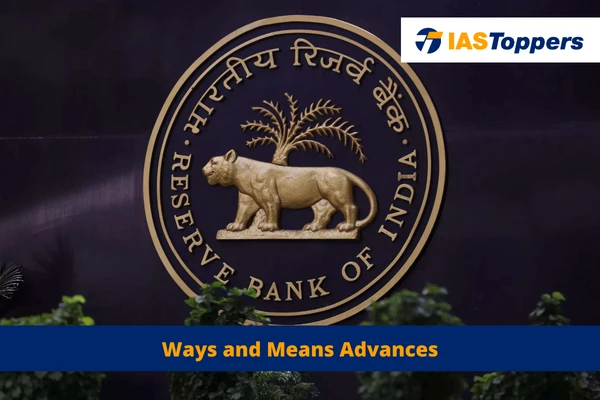Ways and Means Advances, or WMA, is like a temporary loan from the Reserve Bank of India (RBI) to the central or state governments. This loan was created in 1997 to help the government when there is a mismatch in its receipts and payments. The government can borrow cash instantly but has to return it within 90 days, else it becomes an overdraft.
In this article, you will learn meaning and definition of Ways and Means Advances, how does Ways and Means Advances, its limits and significance. To explore more interesting UPSC Economy GS Paper -3 concepts similar to Ways and Means Advances, check out other articles of IASToppers.
Table of Content
- What are Ways and Means Advances (WMA)?
- How does the central government address short-term financial requirements?
- How does Ways and Means Advances work?
- What is the Ways and Means Advances (WMA) Limit for government?
- Ways and Means Advances (WMA) Limit for the State Government
- Ways and Means Advances (WMA) Scheme for State Government
- Significance of the Ways and Means Advances (WMA) Scheme
- Conclusion
- FAQs on Ways and Means Advances
What are Ways and Means Advances (WMA)?
- It is a facility through which temporary loan is given by RBI to the central and state governments.
- It was launched in 1997 to meet mismatches in the receipts and payments of the government.
- It was enacted to replace the 40-year-old system of ad hoc Treasury bills used to finance the central government deficit.
- It is governed by section 17(5) of the RBI Act of 1934.
How does the central government address short-term financial requirements?
The primary methods employed by the government to handle budget shortfalls or liquidity imbalances include:
- Issuance of Treasury Bills,
- Ways and Means Advances (WMA),
- Disbursing Cash Management Bills
How does Ways and Means Advances work?
- The Government can avail immediate cash from the RBI, if required. But it has to return the amount within 90 days.
- Interest is charged at the existing repo rate.
- If the WMA exceeds 90 days, it would be treated as an overdraft.
- Interest rate for overdraft: Repo rate + 2% (If availed up to 100 % of WMA limit).
- Interest rate is5%,if it exceeds 100 per cent of WMA limit.
- Overdrafts are not allowed beyond 10 consecutive days for central government and 14 consecutive working days in case of State government (with a limit of 36 days in a quarter).
What is the Ways and Means Advances (WMA) Limit for government?
- The limits for WMA are decided by the government and RBI mutually and revised semi-annually.
- The Reserve Bank of India has fixed the Ways and Mean Advances limit for H2 of FY 2022-23 at INR 1,50,000 crores.
Ways and Means Advances (WMA) Limit for the State Government
- Each state’s limit is determined by various criteria, including overall spending, revenue shortfall, and fiscal situation.
- These parameters are reviewed regularly, with prior implementation rates taken into consideration when calculating new limits.
- The amount of money available through WMA is restricted to one per state.
Ways and Means Advances (WMA) Scheme for State Government
Under the WMA scheme for “State” government, there are two types of WMA: Special and Normal.
Special Ways and Means Advances (WMA)
- Special WMA or Special Drawing Facility (SDF) is available before availing the normal WMA.
- It is provided against the collateral of the government securities held by the state.
- The interest rate for SDF is 1% less than the repo rate.
- SDF facility is linked to the quantity of investments of state government in the Government of India securities including Auctioned Treasury Bills (ATBs) as well as incremental investment in Consolidated Sinking Fund (CSF) /Guarantee Redemption Fund (GRF).
Normal Ways and Means Advances (WMA)
- After the state has exhausted the limit of SDF, it gets normal WMA.
- The number of loans under normal WMA is based on a three-year average of actual revenue and capital expenditure of the state.
Significance of the Ways and Means Advances (WMA) Scheme
- State governments were already facing financial challenges before Covid-19. The worsening economic conditions further impacted their revenue streams, leading to an urgent requirement for substantial monetary support to address various issues.
- WMA enables states to borrow short-term cash when tax receipts are unpredictable due to adverse economic conditions.
- WMA is a good viable option as a substitute for borrowing long-duration funds from the markets, issuing State government bonds (State development loans), or obtaining short-term loans from financial institutions.
- Acquiring funds through Ways and Means Advances is considerably cheaper than borrowing from the marketplace as it has lower interest rate.
Conclusion
Ways and Means advances serve to bridge temporary gaps in cash flow for both receipts and payments, rather than offering long-term financial assistance. This system grants leverage to the central and state governments to borrow from the RBI, which in turn aids in managing the government’s financial transactions.
Ref:Source-1
| Other Articles in Economy | |
| Long Term Repo Rate Operations (LTRO) | Foreign Exchange Rate |
| Funds of Central Government in India | Asian Development Bank |
| Regional Rural Bank | New Industrial Policy 1991 |
FAQs (frequently asked question)
What are Ways and Means Advances (WMA)?
Ways and Means Advances (WMA) is a facility where the RBI provides a temporary loan to the government to meet short-term financial requirements.
How does Ways and Means Advances (WMA) work?
WMA allows the government to instantly borrow cash from the RBI, which must be returned within 90 days to avoid being treated as an overdraft with higher interest.
What is the significance of the Ways and Means Advance Scheme?
The Ways and Means Advance Scheme is significant as it provides an efficient, cost-effective solution for state governments to manage short-term financial gaps, especially during uncertain economic conditions.



